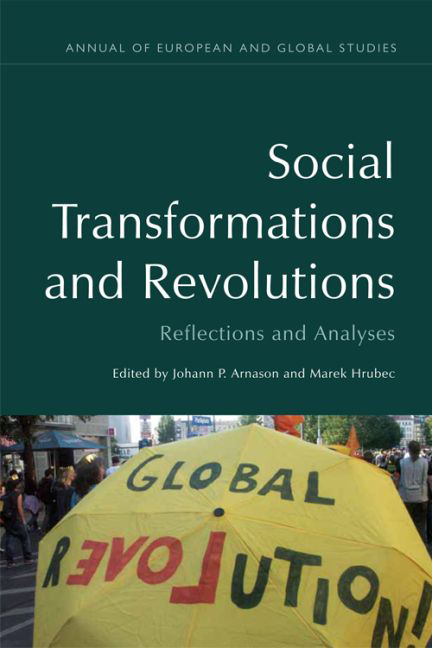Book contents
- Frontmatter
- Contents
- 1 Introduction
- 2 A Trialogue on Revolution and Transformation
- 3 Revolutions, Transformations, Civilisations: Prolegomena to a Paradigm Reorientation
- 4 The Transformation of Capitalism and the Limits of Democracy
- 5 From Civilisational Crisis to Revolutionary Transformation?
- 6 Environmental Crisis and Political Revolutions
- 7 Communists and Social Democrats in the Hungarian Soviet Republic
- 8 Can Political Participation Become Dangerous for Democracy? Participatory Experiences in Brazil and the Reactions Against Them
- 9 Hidden Revolutionary Processes in 1990s India?
- 10 Matching Reforms of Political and Economic Systems of China
- Notes on the Contributors
- Index
5 - From Civilisational Crisis to Revolutionary Transformation?
Published online by Cambridge University Press: 15 September 2017
- Frontmatter
- Contents
- 1 Introduction
- 2 A Trialogue on Revolution and Transformation
- 3 Revolutions, Transformations, Civilisations: Prolegomena to a Paradigm Reorientation
- 4 The Transformation of Capitalism and the Limits of Democracy
- 5 From Civilisational Crisis to Revolutionary Transformation?
- 6 Environmental Crisis and Political Revolutions
- 7 Communists and Social Democrats in the Hungarian Soviet Republic
- 8 Can Political Participation Become Dangerous for Democracy? Participatory Experiences in Brazil and the Reactions Against Them
- 9 Hidden Revolutionary Processes in 1990s India?
- 10 Matching Reforms of Political and Economic Systems of China
- Notes on the Contributors
- Index
Summary
STRONG PERCEPTIONS OF crises have been in the making since the 1970s. The plurality of crises results from dynamic transformations of politico-economic, societal and environmental conditions. Numerous highly problematical consequences of the transformations are produced and reproduced. The crisis of industrial civilisation, related to both social and environmental limits, can be illustrated by a critical analysis of empirical phenomena reflecting the ‘creative destruction’ brought about by the ‘capitalist perestroika’ over the last forty or so years. Policies adapting to these crises decisively shaped the ‘neoliberal turn’ of Western societies, responding to economic, social and technological changes in ambiguous ways: they combine deregulation with new modes of control and certain civilising efforts. In this context, the global expansion of ostensibly free-market capitalism, accompanied by relocations of industries and new directions of technological innovation, has played a key role; to put it another way, the present configuration of capitalism is both conducive to crises of social and environmental reproduction and able to frame responses to them. This configuration affects global civilisational dynamics, now headed either towards further degradation of humanity and the planet or to the generation of something new. To radicalise the issue, the question is whether a revolutionary transformation of both capitalism and civilisation could be on the horizon.
Transformations and risks in global civilisation
It is necessary not only to address the growing problems linked to social changes, but to do so with due regard to their increasingly global dimensions and repercussions. In the late 1960s, the Czech philosopher and sociologist Radovan Richta and his research team formulated an analysis of social and human aspects of the technological and scientific revolution with particular emphasis on its social and human dimensions. Their famous book Civilisation at the Crossroads (the most widely translated Czech publication in the social sciences) was an exemplary case of civilisational analysis, in some ways anticipating the crisis atmosphere in the 1970s (Richta 1967). They were writing about ‘civilisation at the crossroads’ in light of a new transformation of productive forces, based on scientific discoveries and leading, as they argued, to a scientification of society. Almost half a century later, we can still link up with their attempt to locate social transformations and possible alternatives within a global civilisational context, and to grasp the cognitive and technological basis of the latter.
- Type
- Chapter
- Information
- Social Transformations and RevolutionsReflections and Analyses, pp. 76 - 98Publisher: Edinburgh University PressPrint publication year: 2016

